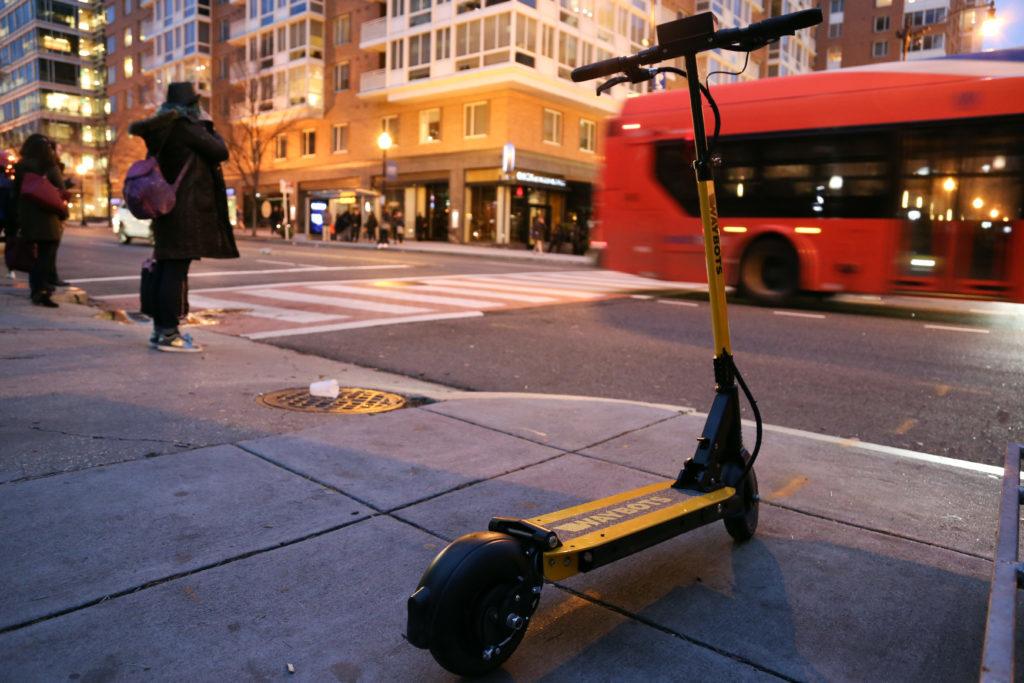Students can now relive their childhood by zooming through D.C. on electric scooters, thanks to a new public scooter program that launched last week.
The transit-sharing company Waybots began offering “dockless” scooters in D.C. under similar terms as the city’s dockless bike program, which launched last fall. D.C. is the first city to test the Waybots’ scooters.
Waybots co-founder Sanjay Dastoor said the company opted for a public scooter program because the scooters are smaller, cheaper and more convenient to use than bikes.
“Transportation is really a set of options that you have and this is just another great option to add to the mix,” Dastoor said.
The electric scooters utilize a mobile application to locate, unlock and lock, and can be picked up and dropped off anywhere in the District, he said. Users are charged for each minute of their ride and each trip costs a flat rate of $1 plus 15 cents per minute, or $10 total for an hour-long ride, according to the app description.
The D.C. Department of Transportation has allowed the scooters to come to the District as part of its ongoing dockless bike pilot program. The agency has granted Waybots permission to test between 50 to 400 scooters in the city as long as the company shares ride-use data with the District, according to a WTOP report.
Dastoor said scooters avoid many of the accountability and safety issues that have emerged with the dockless bikes because they are compact and aren’t large enough to block sidewalks.
“One of the most important things for us was that the system would work well for the whole community and wouldn’t just be there for the riders, but also for the people who need to walk around them and who interact with them in their neighborhood,” he said.
The electric scooters are simpler to use than bikes because they don’t need to be adjusted and can be operated in any attire, Dastoor added. He said the scooters make it easier to maneuver through the congested city and are ideal for trips covering a short distance, like through a neighborhood where riders can move quickly using the bike lane.
“We’d been thinking about this problem for a long time and as traffic and congestion and parking are getting worse, we thought it was the right time to do something like this and add another option,” he said.
Dastoor said the Waybots’ scooters could be useful for helping students reach off-campus destinations for shopping and social activities.
“This makes the places around GW’s campus feel closer because they’re more accessible and it makes it possible for you to meet friends or go do things further outside of the walking radius of the campus,” he said.
Sophomore Austen Schweber said he has used the Waybots scooters often since their release, including taking trips from campus to Adams Morgan.
“Scooters are mainly just a more fun and interesting way to get around places than bikes,” he said in an email. “I am a huge proponent for the dockless bikes as well, but scooters just added an entirely new medium that I had never seen before.”
Schweber added that the scooters are easy to use and feature shock absorbers, which help when going over bumps and curbs in the city. But he said the scooters can be hard to find because there are not as many around the District.
Freshman Dylan Basescu said that although he saw the scooters as a useful option, he would only ride them if a dockless bike was not available.
“I think if the bikes weren’t around, it would be better than City Bikes or anything else, but bikes with the same model of ‘leave it and lock it’ would probably be better,” he said.
William Kennedy Smith, the chairman of the Foggy Bottom and West End Advisory Neighborhood Commission, said the community concerns about the dockless bikes were less about the physical size of the model than about the number of bikes on the streets. He said it’s still early to see how testing both the bikes and scooters will pan out.
“I think the same basic set of issues applies to both the bikes and the scooters, which is what is the proper number and how does the demand on public space get balanced in a way that is helpful and fair to the communities that are supporting it?” he said.





